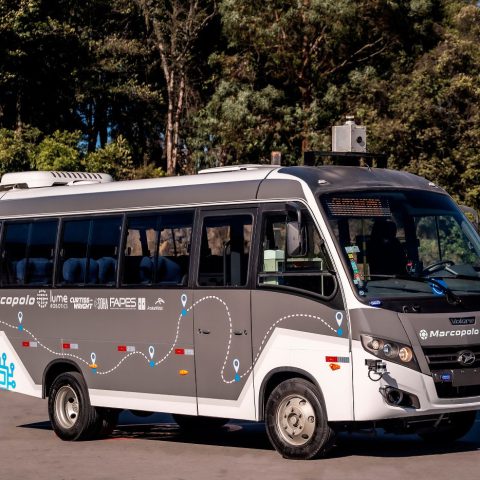Marcopolo has developed an autonomous minibus (with Lume Robotics)
Marcopolo, in partnership with Brazilian autonomous mobility startup Lume Robotics, has unveiled the first prototype of an autonomous minibus in South America. The project, developed over two years with the collaboration of several Brazilian companies, integrates autonomous technology into the Volare Attack 8 model, enabling it to operate fully autonomously without any remote intervention or […]

Marcopolo, in partnership with Brazilian autonomous mobility startup Lume Robotics, has unveiled the first prototype of an autonomous minibus in South America. The project, developed over two years with the collaboration of several Brazilian companies, integrates autonomous technology into the Volare Attack 8 model, enabling it to operate fully autonomously without any remote intervention or monitoring.
Marcopolo autonomous bus made in Brazil
The testing phase for the autonomous minibus prototypes commenced in December 2022. After a successful initial phase, the first evaluation was conducted in March of this year, in a real working environment at the ArcelorMittal steel plant in Tubarão.
The autonomous technology developed for the minibus has the potential to be applied to all Marcopolo buses equipped with automatic transmissions, Marcopolo highlights. However, the Volare Attack 8 was chosen as the ideal model for this study phase due to its versatility and established market presence.
The successful development of the autonomous minibus prototype by Marcopolo and Lume Robotics represents a significant step forward in the advancement of autonomous mobility solutions in South America.
André Vidal Armaganijan, CEO of Marcopolo, stated: “We have strengthened our leading role in the development of mobility solutions and taken another important step in the company’s history. The autonomous vehicle is an example of innovation that aligns with global trends and addresses the challenges of modern cities.”
Rânik Guidolini, CEO of Lume Robotics: “Thanks to the partnership between Lume and Marcopolo, Brazil is among a select group of countries dominating the technology. We are talking about a project capable of delivering safety gains and operational efficiency to mobility systems”.
João Paulo Ledur, Director of Strategy and Digital Transformation at Marcopolo, highlighted the significance of this project, stating, “The first studies for the development of the self-driving minibus strengthen the knowledge and innovation potential. Moreover, this puts us among a select group of countries studying the feasibility of the technology, such as the United States, Germany, and China.”








